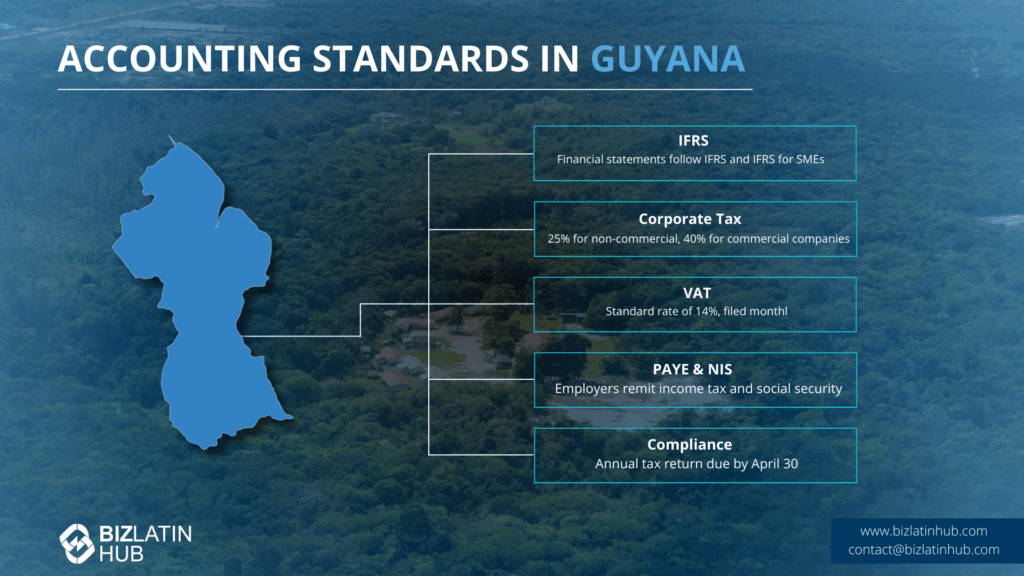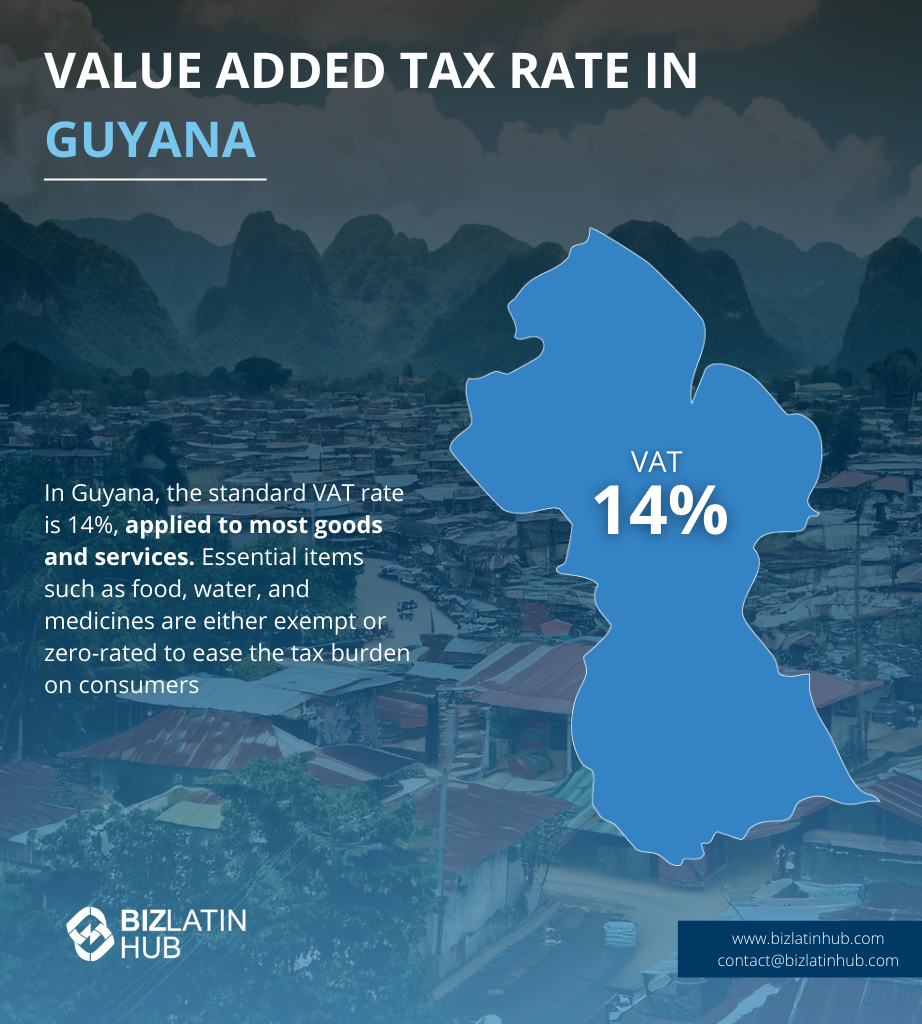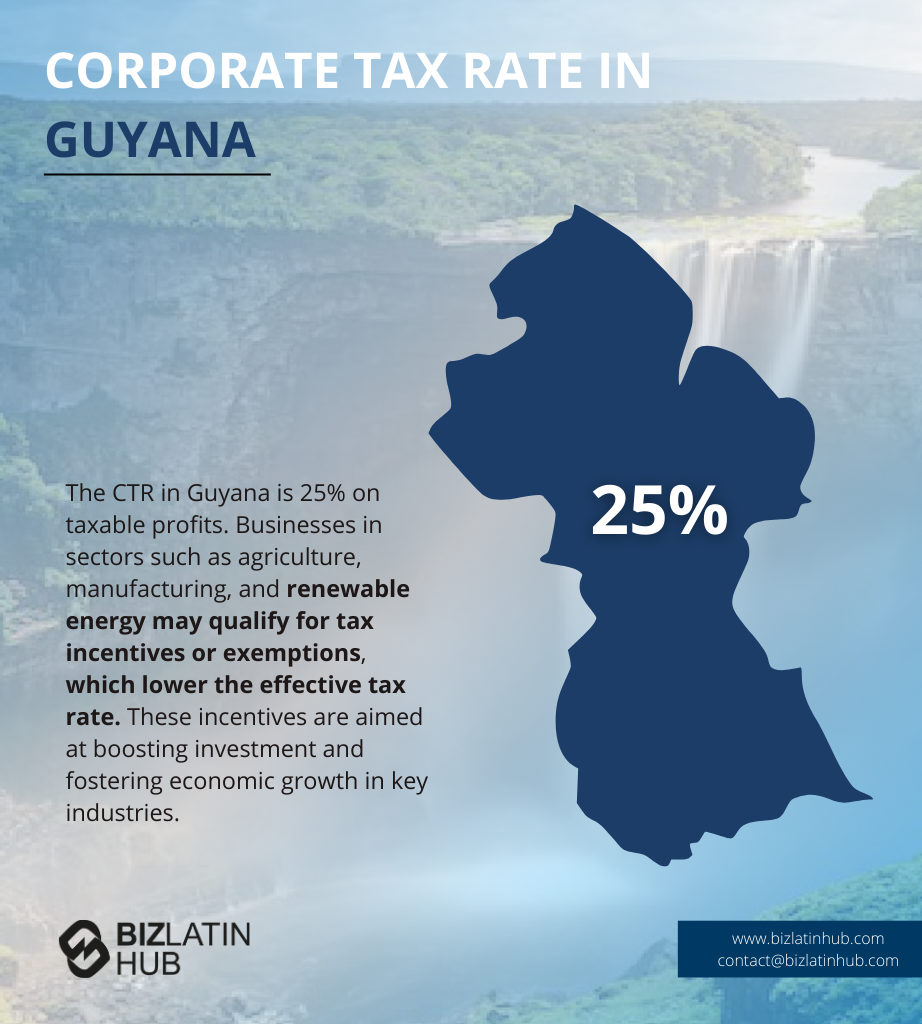Home to a welcoming business environment and rapidly growing economy, Guyana presents promising business opportunities for international investors. The tourism, mining, and agriculture industries, in particular, offer exciting investment prospects for those interested in company formation in Guyana. Before launching your business in this thriving market, it’s essential to understand the regulations for accounting and taxation in Guyana. A lack of knowledge of the local laws could lead to serious compliance and legal problems. This guide details the specific fiscal obligations managed by the Guyana Revenue Authority (GRA), including the dual-rate corporate tax system.
Key Takeaways Tax and Accounting Requirements in Guayana
| What Accounting Standards Are Used in Guyana? | The Institute of Charted Accountants of Guyana (ICAG) is the body that oversees accountants in the country and follows IFRS rules and IFAC guidance. |
| What Is The Corporate Tax Rate in Guyana? | The current rates of corporate tax are as follows: Telephone companies – 45% Commercial companies – 40% Other companies (non-commercial) – 25% Both non-commercial and commercial – 25 – 40% Small businesses engaged in manufacturing and construction services and registered with the Small Business Bureau – 25% |
| What Is The Guyanese Value Added Tax Rate? | VAT in Guyana is either 14% or 0% for registered businesses. Zero-rated supplies include exports and certain medical items. |
| Dividend Tax Rate in Guyana | WHT applies to payments to non-residents. If a treaty rate (UK, Canada, CARICOM) is higher than the statutory rate, the lower rate applies. |
| Do you have to file returns? | All companies must file an annual tax return with the Guyana Revenue Authority (GRA). |
| How often are payments made? | Quarterly advance corporate tax payments are required. |
Key Tax Requirements for Companies in Guyana
Resident companies are taxed on all income earned globally. While non-resident companies operating a business in Guyana are taxed on the income generated within the country.
The tax year aligns with the calendar year. Tax is calculated based on income earned during the assessment year, typically the calendar year preceding the tax year. However, companies using a non-calendar accounting year may request to align taxes with their chosen accounting period.
Tax returns must be completed by April 30th of the tax year.
1. Corporate Income Tax (CIT)
This tax is levied on a company’s net profits. The rate is either 25% or 40%, depending on the nature of the business. Companies must make quarterly advance tax payments and file an annual return by April 30th.
The current rates of corporate tax are as follows:
- Telephone companies – 45%
- Commercial companies – 40%
- Other companies (non-commercial) – 25%
- Both non-commercial and commercial – 25 – 40%
- Small businesses engaged in manufacturing and construction services and registered with the Small Business Bureau – 25%
Expert Tip: Commercial vs. Non-Commercial Classification
From our experience, properly classifying your company as “Commercial” or “Non-Commercial” is vital because the tax rates differ significantly. Commercial companies (trading goods) pay 40%, while non-commercial companies (services) pay 25%.
A company engaged in both pays the respective rates on the split income. We advise service-based clients to clearly structure their operations to avoid being misclassified as “commercial” by the GRA, which would result in a much higher tax burden.
2. Value-Added Tax (VAT)
This is a consumption tax with a standard rate of 14% on most goods and services. VAT-registered businesses must file monthly returns and remit the net tax collected to the GRA.
VAT in Guyana is either 14% or 0% for registered businesses. They must file returns and pay VAT by the 21st of the following month. Zero-rated supplies include exports and certain medical items. Exempt supplies encompass various sectors like education, finance, and certain medical services, as well as renewable energy equipment.
Expert Tip: Managing VAT in a Multi-Rate System
Our experience shows that managing Guyana’s Value-Added Tax (VAT) system can be complex because not all goods and services are subject to the standard 14% rate. Some items are zero-rated, while others are exempt. We advise clients to implement an accounting system that can clearly distinguish between these categories.
Incorrectly charging VAT on an exempt item or failing to charge it on a standard-rated item are common errors that lead to penalties during GRA audits. Proper categorization from the start is essential for accurate monthly filings.
3. Pay As You Earn (PAYE) and Social Security
Employers must deduct PAYE (income tax) and National Insurance Scheme (NIS) contributions from their employees’ wages. The employer also makes their own NIS contribution. These funds must be remitted to the GRA and NIS monthly.
Other key local tax rates
Understanding accounting and taxation in Guyana is crucial when starting a business in this market. Here are the tax rates you need to know.
Income Tax: Residents (present in Guyana for at least 183 days in the year) get a personal allowance of GYD 1,020,000 or 1/3 of their income, whichever is more. For individuals earning under GYD 2,040,000 yearly, the tax rate is 28%. If their income exceeds GYD 2,040,000, the tax rate rises to 40%.
Withholding Tax: WHT applies to payments to non-residents. A return and total monthly payments are due by the 14th of the next month. If a treaty rate is higher than the statutory rate, the lower rate applies. See WHT rates below.
| Recipient | WHT | ||
| Dividends | Interest | Royalties | |
| Non-treaty | 20 | 20 | 20 |
| Treaty: | |||
| Canada | 15 | 25 (1) | 10 |
| United Kingdom | 10 | 15 | 10 |
| CARICOM | 0 | 15 | 15 |

Tax Payment in Guyana
Corporate tax obligations are structured around quarterly advance payments, based on the previous year’s tax liability. These payments are due on the 15th of March, June, September, and December of the preceding calendar year.

However, the Commissioner General reserves the authority to request estimated income calculations for the current fiscal period.
Any remaining tax balance must be settled by the 30th of April in the tax year. Failure to adhere to these deadlines incurs penalties:
- 1. A 10% charge on outstanding tax amounts for failure to file tax returns and settle dues by the end of April.
- 2. Penalties for late payments include a 2% monthly charge on unpaid taxes and an 18% annual interest rate.
- 3. Additionally, a fixed fee of GYD 50,000 is levied for each deficit return submitted after the stipulated deadline.
Tax Audit Process
Tax audits are a routine part of regulatory compliance for companies, often initiated through random selection with an average frequency of every three years.
Upon selection, companies are obligated to furnish comprehensive financial data and relevant documentation to tax officials. Oversight of tax matters in Guyana falls under the purview of the Guyana Revenue Authority. Accounts should be managed by a registered accountant from the ICAG.
The Guyana Revenue Authority (GRA) is the government agency responsible for administering and collecting all taxes in the country. Upon incorporation, all companies must register with the GRA to obtain a Taxpayer Identification Number (TIN). All tax returns and payments are submitted to this authority.
International tax treaties in Guyana
Guyana currently has tax treaties with the following countries.
- Canada
- Caribbean Common Market (CARICOM) member states
- United Kingdom
FAQs on accounting and taxation in Guyana:

Using our experience, we’ve identified common questions and worries our clients often have when dealing with accounting and taxation in Guyana.
1. What are the tax rates for individuals and businesses in Guyana?
Tax rates vary depending on income levels and types of businesses. For individuals, rates range from 28% to 40%, while corporate tax rates are generally 25%.
2. How does the tax year work in Guyana?
The tax year in Guyana aligns with the calendar year, with assessments based on income earned during the preceding year.
3. What are the requirements for VAT registration and filing in Guyana?
VAT registration is mandatory for businesses with taxable supplies. VAT returns and payments are due by the 21st day of the month following the taxable period.
4. What is the Withholding Tax system in Guyana?
WHT applies to payments to non-residents. A return and total monthly payments are due by the 14th of the next month. If a treaty rate is higher than the statutory rate, the lower rate applies.
5. What are the Social Security contribution requirements for employers and employees in Guyana?
Employers must deduct and remit social security contributions on monthly and weekly earnings, with rates of 8.4% for employers and 5.6% for employees.
6. Are there tax incentives for businesses in Guyana?
Guyana offers various tax incentives to encourage investment and economic development. These incentives may include tax holidays, reduced tax rates, and exemptions for specific industries or activities. Interested businesses should consult with local authorities or tax advisors to explore eligibility and application processes.
7. What are the different rates for Corporate Income Tax?
The Corporate Income Tax (CIT) rate depends on the type of company. For commercial companies (those involved in trade, manufacturing, etc.), the rate is 40% on chargeable profits. For non-commercial companies, the rate is 25%.
8. What is the threshold for VAT registration?
A business must register for Value-Added Tax (VAT) if its annual turnover of taxable supplies exceeds GYD$15 million.
9. What is PAYE?
PAYE stands for Pay As You Earn. It is the system by which employers deduct income tax and other contributions directly from their employees’ salaries. These deductions must be remitted to the GRA on a monthly basis.
10. What are the accounting standards followed in Guyana?
Guyana has adopted the International Financial Reporting Standards (IFRS) and the IFRS for Small and Medium-sized Entities (SMEs) as its national accounting framework. All financial statements must be prepared in accordance with these standards.
Biz Latin Hub Can Assist with Accounting and Taxation in Guyana
At Biz Latin Hub, we provide integrated market entry and back-office services throughout Latin America and the Caribbean, with offices in major cities in the region.
We also have trusted partners in many other markets. Our unrivaled reach means we are ideally placed to support multi-jurisdiction market entries and cross-border operations.
As well as our extensive knowledge of accounting and taxation in Guyana, our range of services includes hiring and PEO, accounting and taxation, company formation, bank account opening, and corporate legal services.
Contact us now to learn more about how we can assist you in finding top talent or doing business in Latin America and the Caribbean.






